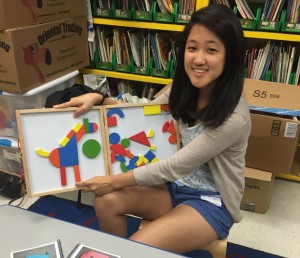By Tyler Alicea ’16, MPS ’17
http://iamhumec.tumblr.com/

In faculty research labs, in communities across the state, and at jobs and internships around the globe, Human Ecology undergrads are making a powerful impact this summer as they apply their knowledge and skills in real-world settings.
Deborah Seok ’17, a human development major from Queens, N.Y., shares her research on toddler spatial language development in Harlem Head Start programs:
What are you working on this summer?
I am working with children in the New York City area to study early development of spatial abilities. For the first study, we are looking at whether spatial training activities, such as origami and playing with Legos, will enhance preschooler spatial skills. The second study looks at what kinds of play experiences contribute to these abilities. More specifically, we want to see whether providing constructive toys, like building blocks and puzzles, to families will enhance toddlers’ spatial skills.
How does this work relate to your coursework?
Much of scientific research focuses on the impact of early experience on human development. The research that I am involved with this summer looks at what kinds of specific factors, such as language input and types of toys played with, can enhance children’s learning abilities. It also addresses bigger scale issues like the effects of socioeconomic status on early development. By running intervention-based research, I am able to take the concepts that I learn in the classroom and apply them to the real-world problems in the community.
Who are your Human Ecology faculty mentors?
My primary faculty mentor is Marianella Casasola, associate professor of human development. As director of the Cornell Infant Studies Lab (CISL) and my research supervisor, she oversees all of the projects that I work on. With her guidance and support, I am able to advance my research experience and knowledge in the field of child development. Steve Robertson, professor of human development, is another faculty mentor who has also played a major role in my academic experience here at Cornell. Having taken two seminar courses with him, I have not only learned so much, but also had many opportunities to discuss and explore my own interests with him.
What excites you about your internship?
I’ve always loved working with children, and this summer is the best experience I could ever ask for. I would say that the best part about my internship is the purpose behind it. As an avid supporter of early development and education, I am so excited to be contributing to research that seeks to enhance early learning experiences and make a difference in children’s lives. This strongly motivates me and gives me a glimpse of what I would like to do in the future.
What societal impacts does your work have?
Our research is centered on early intervention work that seeks to promote spatial skill development in children, both at school and home settings. Working with children at a Head Start center in Harlem, New York, allows us to focus on families from especially disadvantaged backgrounds and target environmental factors such as low socioeconomic status.
Deborah’s summer project, The Role of Language and Play in Promoting Children’s Spatial Skills, is funded by the Cornell Cooperative Extension Summer Internship Program, an effort by the College of Human Ecology and College of Agriculture and Life Sciences to engage undergraduates in work to benefit New York state communities.

